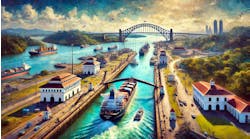Echoing comments made a year earlier by Neptune Orient Lines’ David Lim, Michael Eskew, CEO of UPS, focused on the urgent need for investment and expansion of the U.S. transport infrastructure.
Business leaders must help Americans understand that their jobs and standard of living depend on a U.S. economy that depends on global trade, Eskew told attendees at the Houston Forum. He described as “shocking” the fact that highway, waterway, rail, and aviation networks are not keeping up with ordinary demands.
Eskew’s remarks echo a call to action one year ago by David Lim of Neptune Orient Lines, the world’s sixth largest container shipping company. Lim said efforts must be focused on increasing throughput in the cargo supply chain, not just growing capacity. Increasing volumes continue to put pressure on the transportation infrastructure and carriers, terminal operators and land-based transport companies must work more closely together and must coordinate efforts with industry, government and other interested parties to ensure much needed infrastructure construction is not delayed, said Lim.
The solution for U.S. businesses will require “lots of money,” said Eskew, but that money should be targeted strategically using a holistic strategy. By that, Eskew means taking into account how all air-, ground- and water-based transport systems work together and increasing the integration of the different modes. “All the port capacity in the world won’t prevent bottlenecks if there isn’t enough rail freight capacity on which to unload the ocean shipments,” offered Eskew. Continuing on the rail theme, Eskew said U.S. railroads are under-investing in advanced technologies that could improve the capacity and safety of their networks.
Ports face a budget crisis officials suggested this could seriously hamper port operations and set off a corresponding ripple that would run through the U.S. economy. AAPA estimated 99% of overseas cargo, valued at $2 trillion, moves through U.S. ports annually.


